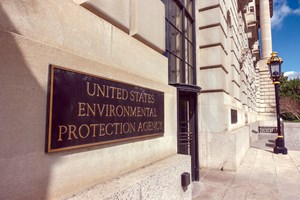EPA to invest $41 million to improve stormwater infrastructure across the country
(UI) – On May 9, the U.S. Environmental Protection Agency (EPA) announced the availability of nearly $41 million in funding through the Sewer Overflow and Stormwater Reuse Municipal Grant program to help communities address stormwater and sewer infrastructure needs.

Safely managing stormwater is critical to preventing contaminants, including untreated sewage, from polluting waterways. EPA’s grant funding is available to states to support projects in cities and towns that will strengthen their stormwater collection systems to be more resilient against increasingly intense rain events made worse by the climate crisis.
When rain and floodwaters overrun sewer and stormwater systems, they bypass treatment and transport pollution and sewage directly into creeks, streams, and rivers. These untreated discharges threaten human health, economic prosperity, and ecological function.
Stormwater management is a complex challenge for communities across the country. This grant program will prioritize stormwater infrastructure projects in small and/or financially distressed and disadvantaged communities and prevent cost share requirements from being passed on to these communities.
Additional funding for stormwater and wastewater upgrades is available through President Biden’s Bipartisan Infrastructure Law and EPA’s Water Infrastructure Finance and Innovation Act (WIFIA) program.
Through the Bipartisan Infrastructure Law, EPA is providing $11.7 billion to states to upgrade wastewater infrastructure through the Clean Water State Revolving Fund. Additionally, the seventh round of EPA’s WIFIA financing is available—with $6.5 billion through WIFIA and $1 billion through SWIFIA.
EPA is currently accepting letters of interest for WIFIA and SWIFIA, a loan program exclusively for State infrastructure financing authority borrowers. Learn more about submitting a letter of interest for a WIFIA loan.
Stormwater can be a significant source of water pollution and a public health concern. Stormwater can collect various pollutants including trash, chemicals, oils, and dirt/sediment and convey them to nearby waterways. When mixed with domestic and industrial wastewater in combined sewers, stormwater can also contribute to combined sewer overflows during heavy storm events.
Related News
From Archive

- Glenfarne Alaska LNG targets late-2026 construction start for 807-mile pipeline project
- U.S. water reuse boom to fuel $47 billion in infrastructure spending through 2035
- $2.3 billion approved to construct 236-mile Texas-to-Gulf gas pipeline
- Major water pipe break in Puerto Rico hits over 165,000 customers
- Potomac River Tunnel project enters construction phase beneath Washington, D.C.
- Pennsylvania American Water launches interactive map to identify, replace lead water service lines
- Trump's tariffs drive $33 million cost increase for Cincinnati sewer project
- Utah city launches historic $70 million tunnel project using box jacking under active rail line
- Tulsa residents warned after sewer lines damaged by boring work
- Fatal trench collapse halts sewer construction in Massachusetts; two workers hospitalized



Comments